April 27, 2023
Faculty, staff, students and community across the state came together on April 14-15 for the NC Consortium for Middle Eastern Studies 2023 conference centered on “Border Politics: Bodies, Community and Ecology.” The 2 day event (also co-sponsored by the UNC Institute for Arts and Humanities and Center for Middle East and Islamic Studies) featured film screenings and discourses of Global Futurism, and the power of borders as zones that both separate and connect different bodies, communities, and ecologies.
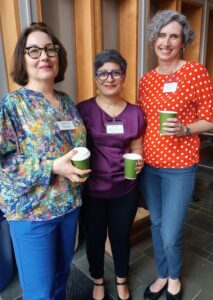
The conference was kicked off by organizers Banu Gökariksel (Geography, UNC-CH), Jennifer Gates-Foster (Classical Archeology, UNC-CH) and Nadia Yaqub (Asian & Middle East Studies, UNC-CH) *in absentia, as well as CMEIS director Claudia Yaghoobi (Persian Studies, UNC-CH). They introduced the genesis of the conference theme of borders, explaining how they are continuously produced by a complex ecology of material and immaterial actors, including the state, surveillance technologies, physical landscape, migration policies, discourses about enemies and foreigners, people on the move, and archaeological objects. They connect past and future and make possible different imaginations of borders.
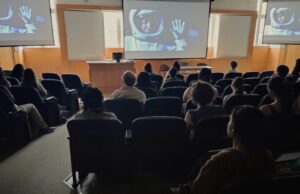
Next was a screening of 4 short films from Palestinian director Larissa Sansour: “Space Exodus”, “Nation Estate”, “In the Future “They Ate from the Finest Porcelain”, and “In Vitro”, which provided an example of one artist’s reimagining of Palestinian border ecologies through futuristic science fiction.
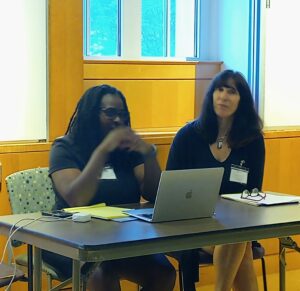
The films were followed by a discussion between Priscilla Layne (German/Slavic Studies, UNC-CH) and Robin Visser (Asian & Middle East Studies, UNC-CH), who drew parallels between ideas and motifs from the films with themes in Afro-futurism and Chinese literature. The 45 Students and faculty in the audience added further insights and examples of transnational connections including contemporary YA fiction, cinema, and more.
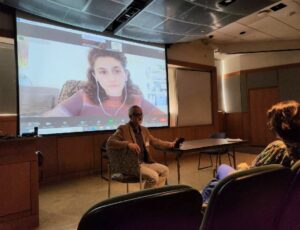 Saturday morning drew 25 people out of bed for a screening of the film “Foragers” by Palestinian director Jumana Manna. The film tells the story of Palestinian foragers, who collect wild edible plants, and how Israeli laws that restrict the activity constitute an ecological veil for legislation that further alienates them from their land. Afterwards, Yaron Shemer (Asian & Middle East Studies, UNC-CH) facilitated a Q&A discussion with director Jumana (joining via zoom) to talk about local ecologies, and her processes and methodologies when making the film. Members of the audience brought up themes of gender roles, the symbolism of language, the relationships between land; memory; tradition and identity, and connections to similar examples across indigenous cultures world wide.
Saturday morning drew 25 people out of bed for a screening of the film “Foragers” by Palestinian director Jumana Manna. The film tells the story of Palestinian foragers, who collect wild edible plants, and how Israeli laws that restrict the activity constitute an ecological veil for legislation that further alienates them from their land. Afterwards, Yaron Shemer (Asian & Middle East Studies, UNC-CH) facilitated a Q&A discussion with director Jumana (joining via zoom) to talk about local ecologies, and her processes and methodologies when making the film. Members of the audience brought up themes of gender roles, the symbolism of language, the relationships between land; memory; tradition and identity, and connections to similar examples across indigenous cultures world wide.
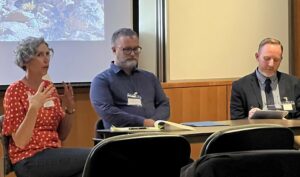
After feasting on a lunch of Tacos, 45 people attended Panel I, enjoying presentations from Sandy Marshall (History and Geography, Elon University) on “Bordering Sacred Space: (Re)Storying Fractured Sacredscapes in Palestine” and Jim Frakes (Art and Art History, UNC Charlotte) on “The temple at Khirbet et-Tannur: interpreting arrival within epiphanic landscape.” Discussant Jennifer Gates-Foster then led a conversation about the intersection of physical space, it’s representations in art and architecture, politics, history and identity.

During a quick caffeine break, the 35 attendees chatted and shared their thoughts about the role that borders, spaces and the narratives in their own works building connections across disciplines and areas of focus.
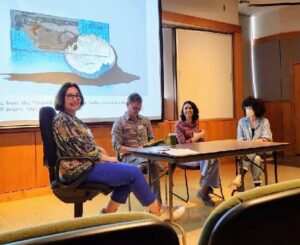
Wrapping up the conference was Panel II featuring Emek Ergun (Global Studies, UNC Charlotte) presenting on “Crossing Borders in Translation: Feminist Solidarity in the Making”, Asa Eger (History, UNC Greensboro) on “Temporal Borders and Permanent Liminalities: Viewing the first century of the Islamic-Byzantine Frontier as a chronological inflection point” and Paniz Musawi Natanzi (Gender, Sexuality and Feminist Studies, Duke University) on “Visualizing violence: masculinity and politics of race and death in Afghan/istani visual arts under military occupation.” Banu Gökariksel led a discussion with all three panelists about the impact of politics both defining and crossing borders, with examples and themes from feminism, race and religious movements and restrictions.
Thanks to all who joined us in these illuminating, transdisciplinary, global discourses!
